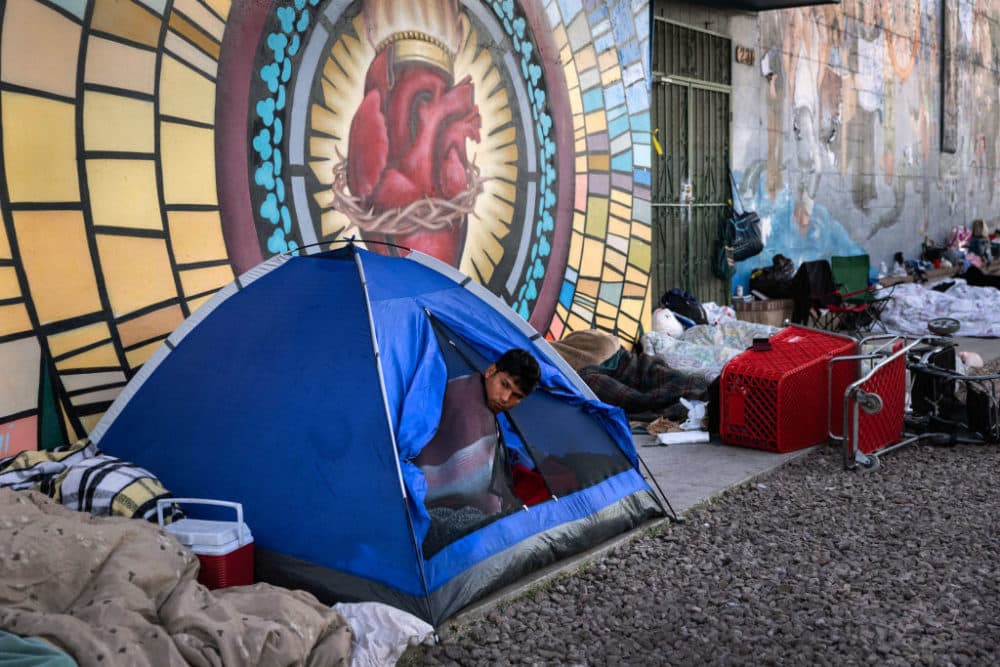Advertisement
Commentary
Biden's new immigration orders look a lot like Trump's

“Rose” was brutally beaten by her husband in Haiti. Still bleeding, she sought help from the police. They told her it was “a problem between a husband and wife” and sent her home, where her husband attacked her again, knocking out her tooth and leaving her with a 4-inch scar across her forehead.
Terrified, Rose fled Haiti in the middle of the night. Like many other migrants, Rose presented herself at the U.S.-Mexico border, and expressed a fear of return. She had no authorization to be in the United States — and at the time, she didn’t need any. Our asylum law, codified in the Refugee Act of 1980, allows for individuals fleeing violence and persecution to seek protection in exactly this way. Today, Rose is safe in Massachusetts, where she was granted asylum and now works as a nurse.
But under President Biden’s recently announced “Border Enforcement Actions,” it is unlikely we would even know Rose’s name.
Last week, the Biden administration announced aggressive new border enforcement initiatives and draconian restrictions on asylum, some of which specifically target nationals from Haiti, Venezuela, Nicaragua and Cuba. Biden said that his new plan will “limit disorderly and unsafe migration,” but the truth is far more harrowing. In fact, the Biden plan repackages some of the most troubling immigration and asylum policies from the Trump era and offers them up as novel solutions. These policies didn’t work then, and they won’t work now. Instead, they offer an insidious, inhumane and illegal response to a complex problem.

First, the Biden plan promises to expand a program that currently applies to Venezuelan nationals to migrants from Cuba, Haiti and Nicaragua. While the program sounds promising in theory — an expanded avenue for authorized migration from countries with large numbers of intending migrants — the devil is in the details. Under this program, hopeful beneficiaries must, among other requirements, have a sponsor in the United States, have a valid passport and be able to pay for their own commercial plane travel to the U.S. Even with those requirements met, migrants would have to pass thorough background checks while remaining in their country of origin. Those who seek to travel through Central America and Mexico, as many asylum seekers do, would be automatically ineligible for the program.
Rose, and many like her, could not comply with the financial and documentation requirements. They would also be unlikely to survive in their home countries while waiting for the slow wheels of bureaucracy to turn.
Advertisement
Biden’s plan also purports to offer remedies for migrants from Central America and Mexico, tens of thousands of whom hope to enter the United States. Currently, Title 42, a set of restrictions implemented by the Trump administration as a purported public health response to COVID-19, in fact acts to gut asylum -- to rapidly expel migrants at the border before they can seek it. Despite experts recommending against its continuation, Biden, who actively campaigned on a promise to restore asylum, has instead doubled down on Title 42, taking cover behind court orders that require his administration to keep the controversial order in place. As a result of Title 42, many would-be asylum seekers from Central America and Mexico are camped out in dangerous border towns, and at high risk for violence and extortion.
Unfortunately, Biden’s policies, though perhaps quieter and less bombastic [than Trump's], have been just as unrelenting.
Even if some future court does ultimately strike down Title 42 once and for all, the Biden administration’s latest border initiative contains a response that may stand, regardless of whether or not Title 42 remains: (1) expanded expedited removal and (2) an “app.”
Expanded expedited removal will mean that clients of mine from Mexico and Central America — transgender women fleeing homophobic violence in El Salvador and teenage boys escaping gang recruitment in Honduras, among others — will be immediately expelled back to their country of origin, and face a five-year ban on re-entry.
Back “home,” many of my clients won’t survive. The Biden administration’s response? There’s an app for that. They say that if asylum seekers must come, they should avail themselves of U.S. Customs and Border Protection’s new “CBP One Mobile Application” before leaving home. The White House notes that asylum seekers can schedule an appointment “to present themselves for inspection and to initiate a protection claim instead of coming directly to a port of entry to wait.” When Rose fled her abusive husband in the middle of the night, not only did she not have access to a smartphone, but if she had, the idea that she could have logged on to an app, in a language she cannot read or understand, to schedule an appointment with an agency thousands of miles away, is, at best, laughable.
Briefing the press on his new border security and enforcement measures last week, President Biden was unequivocal, “[m]y message is this…stay where you are.” On the campaign trail, President Biden accused former President Trump of waging “an unrelenting assault on our values and our history as a nation of immigrants.” There’s no doubt that he was right. Unfortunately, Biden’s policies, though perhaps quieter and less bombastic, have been just as unrelenting.
The “Roses” of the world cannot simply “stay where they are” as long as “where they are” puts them directly at risk of harm and death.
